
How to Stop Losing Your Temper on Court
Do you know there is a choice in the Energy Source you choose to fuel your competitive desire?
Our desire, or lack of it, is determined by our ability to tap into the various sources of energy that are available to us. There are, however, states of mind that give us positive energy or thoughts that sap our energy. Energy sappers need to be avoided if you want to be successful. Arthur Ashe showed incredible power of balanced thought even when faced with death through inconceivable bad luck. It is this quality that contributed to his success as a player because even imminent death could not persuade him to succumb to negativity.
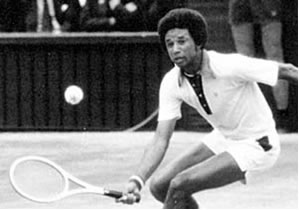 “If I were to say, ‘God, why me?’ about the bad things, then I should have said, ‘God, why me?’ about the good things that happened in my life.” (Arthur Ashe)
“If I were to say, ‘God, why me?’ about the bad things, then I should have said, ‘God, why me?’ about the good things that happened in my life.” (Arthur Ashe)
There are positive and negative energy sources. Positive energy sources help performance, but occasionally, negative energy sources are also helpful. Largely negative energies hinder performance, but anger is an example of an energy source which is more complex. While it is primarily a negative source of energy, if controlled, and used sparingly, it can also have a short-term positive effect on performance. If you are striving for success, the key is to use the positive energy sources available to you to fuel your desire and abilities to perform. In order to do this you have to be aware of energy and how it works and then learn how to use it effectively.
Enthusiasm
The greatest energy source in the world is enthusiasm and it is purely positive and essential to success. It is powerful, healthy and infectious, bringing joy to most of the work needed to be done. When people learn to tap into enthusiasm (often referred to in terms of passion, love of the game, great work ethic and attitude), there is an amazing amount of effortless energy to burn. Enthusiastic people only need to ensure they get enough rest to recharge the batteries and off they go again, completely refreshed, even after setbacks.
The greatest exponents of enthusiastic energy are young children. They will partake in any activity they think is fun with great joy and energy. The killers of enthusiasm are often poor teaching practices that bore the enthusiasm out of children. In teenage years, the awareness of sexuality can foster embarrassment and self-consciousness which both tend to inhibit learning and enthusiasm.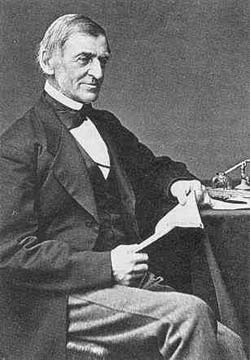 “Enthusiasm is the mother of effort, and without it nothing great was ever achieved” (Ralph Waldo Emerson: American Poet and essayist)
“Enthusiasm is the mother of effort, and without it nothing great was ever achieved” (Ralph Waldo Emerson: American Poet and essayist)
It is clear that succeeding in anything has its element of grind; sometimes the hard work is fun, but at other times it is not and simply just has to be done. Time management is crucial in achieving the right balance to progress – overload a person with grind and there is the danger of killing the enthusiasm for the subject, sport, or project; not enough grind, however, and the skills are not embedded strongly enough to excel.
Time management for young children is a tough challenge for parents, teachers, and coaches. They need great skill to ensure they get the right balance of allowing children to do fun activities but also making sure they do the more mundane jobs that are also necessary for their development. For example, parents have to balance the time they allow children to play with the time necessary to complete their homework, while coaches need to balance the fun and favorite games with the less popular but necessary drills. Of course, the ultimate skill is to disguise the more boring jobs within enjoyable games.
As children become teenagers, their workload increases and the skill required to manage their time successfully becomes more complex. The overall feeling is still that the work should be fun but must also include the awareness that the work is worthwhile. Young hopefuls need to believe that delayed reward is worth it, and that achieving their goals will feel so good that it fuels their enthusiasm. During this phase of their development, the key is to manage the level of competition and the setting of goals as effectively as possible to sustain their enthusiasm.
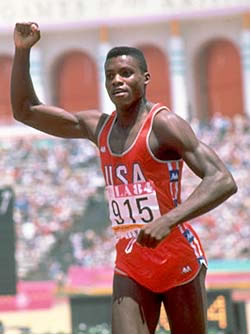 This process of planning the right level of competition and setting appropriate goals is not easy to manage and therefore most young competitors need a support team; one which has the skills and knowledge to manage the process successfully and foster enthusiasm for the task. If this process is not managed well, competitors will begin to draw on other energy sources, namely anger or fear, to drive them forwards. Unfortunately these are negative energy sources which not only destroy promising careers but also sap the energy levels of those around them.
This process of planning the right level of competition and setting appropriate goals is not easy to manage and therefore most young competitors need a support team; one which has the skills and knowledge to manage the process successfully and foster enthusiasm for the task. If this process is not managed well, competitors will begin to draw on other energy sources, namely anger or fear, to drive them forwards. Unfortunately these are negative energy sources which not only destroy promising careers but also sap the energy levels of those around them.
“Channel your energy. Focus.” (Carl Lewis)
Libido
Our libido, or sexual drive, is an incredibly powerful energy source and can be channeled into positive or negative action. It is, however, a positive energy and provides us with enormous drive to get things done in order to attract the attention of the opposite sex. The amount of fuel that people are capable of burning when chasing, flirting, planning a date, dancing, staying up late, or when involved in countless other pursuits in attempting to attract the attention of, or entertain, someone they are attracted to is immense. This passion gives people the energy to act in powerful ways which can be either productive or destructive. History is full of legacies from people who have driven themselves to great heights in order to win over, provide for, or impress a partner. Equally, they have been driven to break marriages, commit murder, or even start wars for love or pursuit of a partner.
The important distinction in whether this energy of attraction can lead to success or failure is where the focus lies in achieving the prize. A person can either use enormous energy focusing on the game of pursuit, leaving less energy to use on his or her career or use the bulk of the energy on the career, using spare time for pleasure and establishing relationships where there is an understanding that there is work time, play time, and rest time.
When the balance changes to play time, work time and often little rest, it is only an exceptional few who can play hard, work hard, and succeed. These individuals have an excellent capacity to focus on purely one or the other of these activities. Most people, however, struggle to do this – their minds are either preoccupied with work when they are trying to play or vice-versa. Some good sportsmen achieve enough success during the party years to continue on to a sporting career. They may use their sport as a tool in helping them create an edge over their rivals in the chase. The kudos associated with being a professional tennis player or footballer for example, motivates them to succeed and sometimes, if they have a genuine love for the sport, these individuals can begin to excel in their mid to late twenties when maturity gives them better balance. This is a precarious balance because often when they decide to focus more on their sport, the window of opportunity has closed and their story becomes the familiar "I could have been…"
"My basic problem was that I would get all tripped out by the negatives – bad calls, bad days, bad feelings – and anger got to be a habit. I was like a compulsive gambler or an alcoholic. Anger became a powerful habit." (John McEnroe)
Anger
Anger is a powerful and immense source of energy which is highly combustible and unsustainable over long periods. Using anger as an energy source is a dangerous strategy and although it can achieve short-term success, it will always leave one feeling very flat and drained. It is also highly unreliable because it can adversely affect our thought processes; many poor decisions are made during a fit of anger. Players who continually explode and draw on this energy to be aggressive rarely achieve success. The combination of poor decisions and flat periods ruins their ability to fight effectively and, as the losses pile up, the anger becomes increasingly negative and self-directed. Excuses and disappointment gain greater holds on the mind and the anger turns bitter, becomes more erratic, and adds to the confusion during the flat periods.
Competitors who learn to control anger, which I call “Simmerers” can have better results. These people play with anger simmering under the surface and although the energy levels are erratic because of the constant fight to keep control of the anger, they do have outbursts followed by periods of aggression which can turn matches in their favor. They have realized that exploding all the time is not the answer but when they attempt to remain calm; they become flat, struggle for energy and quickly discover that this state does not win matches.
Simmerers have not worked out, or been made aware of any other energy source than anger, so they continue to draw on this as their sole energy source. They try as best they can to keep a lid on it unless provoked to an exploding point. It is mentally tough for simmerers to get through matches without exploding; a draining experience which ends either in the huge relief of winning or massive self-persecution in losing. Matches become mini traumas and personal battles. Keep the lid on too tightly and there is not enough energy; too loose and explosions occur. Even if the simmerers are able to get the balance right, their focus on their personal battle is so strong it is very tiring and difficult for them to ever see what their opponent is up to or feeling.
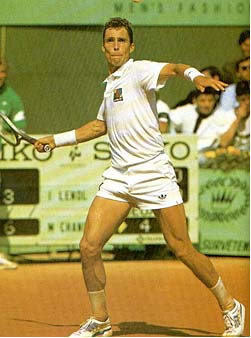 Unless you learn to draw on enthusiasm as the energy source, competing and winning consistently is impossible. ‘What about the myriads of examples of successful angry people?’ I hear you say. These can be easily explained. Anger can be very useful and highly effective to kick-start a listless performance. If it is short and sharp it can inspire bravery and aggression. However, it soon needs to be replaced by calm enthusiasm for the job at hand which, at a high level, will always require calm decision-making and energy that is not draining.
Unless you learn to draw on enthusiasm as the energy source, competing and winning consistently is impossible. ‘What about the myriads of examples of successful angry people?’ I hear you say. These can be easily explained. Anger can be very useful and highly effective to kick-start a listless performance. If it is short and sharp it can inspire bravery and aggression. However, it soon needs to be replaced by calm enthusiasm for the job at hand which, at a high level, will always require calm decision-making and energy that is not draining.
Way ahead against Lendl at the '84 French Open, one line call was enough to send McEnroe over the edge.
Some people are able to use anger for controlled effect, recognize the loss of control quickly and transfer to using enthusiasm, or use anger to become aggressive and overcome fear before transferring to another energy source. Although they can be highly unpleasant to watch or to work under, these people can also be very effective. However, they are always vulnerable because periodically their loss of control gives their opponents the edge which is often never relinquished. If you analyze angry, successful people, the time they spend in a contest being angry is actually minimal but the impact is often memorable. They have long periods of clear decision-making unless the opponent is not good enough to challenge, in which case they can afford to release anger without the risk of defeat.
Clouded judgment has lost many a sportsman victory:
• McEnroe to Lendl in the French Open (1984) – McEnroe was the best player in the world at this time while Lendl had a reputation for choking in Grand Slam finals (4 up until that point). Lendl was being soundly beaten by McEnroe, two sets to love and was 2-4 in the third set when McEnroe went crazy at a line call on his serve, dropped serve and the set 7-5. He later said he got so angry because he felt he needed to finish the match quickly as he was feeling fatigued. The fact is that his anger confused his mind and he lost the match two hours later 7-5 in the fifth set. He would have been a lot less fatigued if he had remained focused and energized in the third set.
• Hingis to Graf in the French Open (1999) – Having won the singles and doubles at the Australian Open at the beginning of the year, Hingis was having a stellar year. She found herself in the final of the French Open facing veteran Steffi Graf, who had not won a grand slam event in three years. Graf considered herself a surprise finalist, admitting frankly that she had entered the French Open that year just to help her fine-tune her tournament skills and sharpen her will for Wimbledon. Graf, almost 30 years of age, faced the dynamic, toothy-grinned 18 year-old from Switzerland in one of the most memorable contests in the history of French Open finals.
Hingis played great tennis, taking the first set, 6-4, and leading 2-0 in the second set when the bottom fell out of her well-ordered, self-assured world. She disputed a line call. Her ball was called out. She felt the ball had hit the line. Hingis asked the umpire to check the line, which she did. The call stood. Hingis then walked over to Graf’s side of the net and pointed to the mark she felt proved her point. This was arrogance in full bloom. It was also grounds for a penalty point. You cannot cross over to the opponent’s side of the net in tennis. Hingis knew that and did it anyway. Still the umpire did not penalize her.
Another bizarre incident at the French Open, this time involving Martina Hingis, probably cost her the one title that has eluded her.
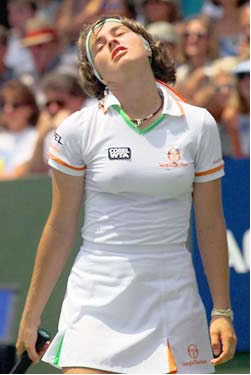 • Hingis refused to play on and instead asked for the tournament referee. THIS WAS THE KEY ERROR! The referee came on court, denied Hingis an overrule and imposed the penalty point. Hingis lost the argument, her composure and her momentum. The French crowd, already pulling for Graf, became absolutely hostile toward Hingis. Graf won the game and the score stood at 2-1. The wrangling continued into the next game when a call went against Graf. Hingis held and went 3-1 up in the second set, but the crowd turned against her viciously. Then Graf, spurred on by her support from the crowd, broke back in the sixth game of the set and held serve to take the lead 4-3. The crowd continued to chant ‘Steffi!’, cheered Hingis’s errors and booed her when she took a break at set all, returning in new clothes and a change in bandana.
• Hingis refused to play on and instead asked for the tournament referee. THIS WAS THE KEY ERROR! The referee came on court, denied Hingis an overrule and imposed the penalty point. Hingis lost the argument, her composure and her momentum. The French crowd, already pulling for Graf, became absolutely hostile toward Hingis. Graf won the game and the score stood at 2-1. The wrangling continued into the next game when a call went against Graf. Hingis held and went 3-1 up in the second set, but the crowd turned against her viciously. Then Graf, spurred on by her support from the crowd, broke back in the sixth game of the set and held serve to take the lead 4-3. The crowd continued to chant ‘Steffi!’, cheered Hingis’s errors and booed her when she took a break at set all, returning in new clothes and a change in bandana.
Hingis was never a factor in the third set. The crowd booed her when in desperation she served underhand to save a match point (a tactic that was applauded when a cramping Michael Chang used it against Ivan Lendl in 1989 Men’s Final). Hingis lost the set 6-2. Graf won the match as much as Hingis lost it, but both were heavily impacted by the French crowd; as one player grew in strength from the support of the crowd, the other diminished in capacity as it turned ugly and berated her every move. Hingis’ self-assured arrogance and anger cost her dearly in this match (she was only 18) and the crowd was unforgiving. It was not a fair fight. She left the court in tears, breaking down completely once the match was over. This match was an opportunity for her to add a French Open title to her career, but it was never to be. Her anger at the call clouded her judgment and perspective of how far ahead she was in the match, causing her to disrespect a great champion and tournament which ultimately, like McEnroe, denied her a chance to win a grand slam on all surfaces.
It is clear that anger is a strong energy source but it is equally evident that it does more damage to the competitor, especially when sustained for any length of time, or when it emerges during the crunch time of a contest when clear thinking and handling pressure in a positive way are crucial to success.
Energy Sappers
Self consciousness: This is an energy killer. It is the particular affliction of the teenager but many adults have the same problem when put under the spotlight. There is no way of competing if your focus is on how you look or on what you perceive others to be thinking of you.
“Show me a guy who’s afraid to look bad, and I'll show you a guy you can beat every time.” (Lou Brock; baseball great)
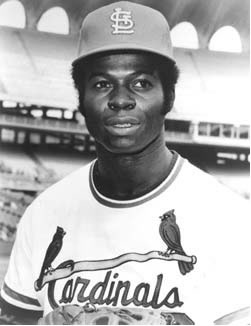 People freeze or become very stilted and nervous when they are self conscious. It becomes difficult to co-ordinate limbs and the brain has difficulty thinking or remembering anything. We speak gibberish or stutter and become acutely paranoid that every error is being scrutinized. Beating the opponent is the last thing on our minds and the prime objective is to not make fools of ourselves.
People freeze or become very stilted and nervous when they are self conscious. It becomes difficult to co-ordinate limbs and the brain has difficulty thinking or remembering anything. We speak gibberish or stutter and become acutely paranoid that every error is being scrutinized. Beating the opponent is the last thing on our minds and the prime objective is to not make fools of ourselves.
Agassi famously revealed in his book that he was more focused on his hair piece falling off than winning the French Open final which shows the amazing power of self consciousness to inhibit a person, even an accomplished performer. Naturally in this energy state it is impossible to compete and win, so anyone who is unable to grow out of this feeling will not succeed in anything which requires focused performance.
This issue has to be dealt with and transformed into “good nerves of anticipation” and enthusiastic energy, proud of what can be accomplished. Often players are self conscious because they are not confident in their ability, so practicing until they feel competent overcomes this problem.
Fear: Fear is a source of negative energy and an energy sapper. Fear inhibits ability and drains a person of energy, often leading to panicked and frozen performances. In other circumstances, it will create nervous energy, which leads to rushing and often wanting the contest to end as swiftly as possible.
Players in this state remember almost nothing about the match after it is over. When engulfed by fear it is impossible to compete effectively. The mind is afraid, worried, panicked, and unclear, while the body cannot function smoothly or efficiently with so many conflicting and negative messages circulating through the nervous system. Fear often manifests itself through a mental fleeing from the contest where players are mentally not there. They check out and withdraw effort waiting for the loss to arrive so they can leave the arena and the source of their fear and mental pain.
The reasons why people are afraid are numerous as are the types of fear. A few examples are fear of failure, success, parents, organizations, coaches, opponents and the list is endless. It helps if you actually identify and write down what your personal fears are which are often less daunting once you see them on paper. Anthony Robbins identifies fear as False Evidence Appearing Real.
"Courage is going from failure to failure without losing enthusiasm" Sir Winston Churchill
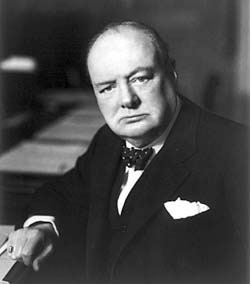 I have had success in helping players become better competitors by making them aware that they have choices in the energy sources they use when it is time to compete. Once aware, they are better equipped to choose enthusiasm as their energy source, learning that trying to stop being angry or afraid is impossible in the long term unless they replace it with another energy source.
I have had success in helping players become better competitors by making them aware that they have choices in the energy sources they use when it is time to compete. Once aware, they are better equipped to choose enthusiasm as their energy source, learning that trying to stop being angry or afraid is impossible in the long term unless they replace it with another energy source.
It is most important to understand that the key to managing your energy source is by controlling what you say to yourself.
Disappointment/Regret:
Competitors get disappointed when expectations aren’t met, or they have blown a winning position at which point they begin to perceive the contest as going against them and begin to think regretfully about the blown opportunity and often roll out the excuses as to why they are in such a sad position.
When a player plays disappointed it leads to self-pity or self-criticism which results in a barrage of negative thoughts in the mind such as ‘Why did that net cord go against me?’ or ‘How could I lose that game? I’m so bad’. This process is damaging as it dampens any positive energy source that might be lingering. It is, however, highly common and for most us incredibly hard to overcome. High level accomplishments require mental toughness. Though apparently simply, mastering what you say or think in your mind requires tremendous discipline. All human beings slip up, especially under pressure, but the best competitors recover their discipline over their thoughts quickly and thus do not dwell on, and therefore perpetuate, mistakes through the remainder of a contest.
Mentally weak competitors, in contrast, are easily distracted from the task, quickly losing discipline over what they think and say to themselves. It is incredible how often these competitors will openly tell their opponents verbally and with body language that they cannot control what they say or think about. They flip from anger to fear; from ranting and raving to moping about; and from competing intermittently to mentally fleeing the contest. In short, they become a complete jumble of conflicting energies and emotions. Not only does this have a detrimental effect on their performance, but it also feeds the confidence of their opponent.
The great test of mental toughness is whether or not you are able to compete enthusiastically from the beginning to the end of a contest regardless of the score. Once you can keep your energy positive right up to the last point and only allow disappointment to set in after the match is lost, or adulation if you are victorious, then you have achieved a mind-set capable of competing enthusiastically whether winning or losing; this is mental toughness! How rare it is to see the likes of Nadal, Federer, Phelps, Armstrong and Sampras react angrily when things go wrong and, if they do, how quickly their outburst is over. Listen to what they say in interviews and you will hear enthusiasm for their job, their sport and the hard work. How often we observe the grace, the dignity and the acceptance of a loss as part of the adventure and the quest to compete with the best.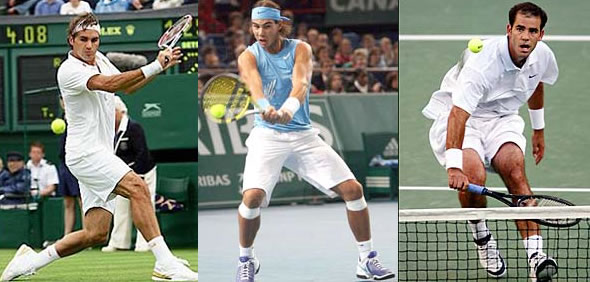
Tips to enhance your choice of energy:
• Spend time with enthusiastic people.
• Watch replays or live matches of role models who inspire you.
• Read articles or biographies of how others found the key to success.
• Seek advice and inspiration from people you trust (eg, a parent or coach).
• Avoid spending time around energy-sappers (people who speak negatively) and replace negative thinking with positive self-talk.
• Use your energy for working hard towards your goals (as opposed to staying up late, for example).
• Learn to control your anger and transform this energy into enthusiasm.
• Remember that to be successful there is no substitute for hard work – make sure this is a priority in your life.
Images are courtesy of tennisone.com

